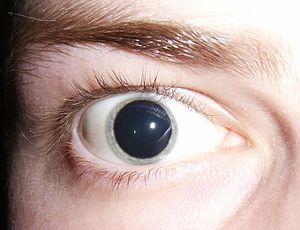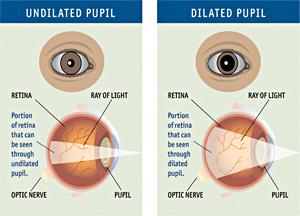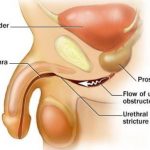Dilated Pupils
What are Dilated Pupils?
Dilated Pupils is the change in size of the pupil as physiological response towards a stimulus. Its occurrence is normal and as a result of involuntary reflex actions. For instance if it is dark or dim, the pupils can dilate (increase in size) so that persons can have a good view of the objects surrounding them.

However there are some cases where the pupil may appear to be fixed or dilated more than it should be. This then results in a condition known as mydriasis that requires medical examination.
Causes
Although it is normal for pupils to dilate, there are other external factors that may trigger the dilation:
Anticholinergics
These are substances found in drugs that result in excessive dilation of the pupil since they hinder the transmission of some vital chemicals into the eyes and other organs such as glands and muscles.
They also have a potential of causing a drying effect in the body, which may lead to a blurred vision, dry mouth, dizziness and constipation.
Eye injury
This may lead to the damage of the iris which is the mother bed of the pupil affecting their normal response to various stimuli such as light.
High levels of oxytocin
Pupils can dilate due to the increase of oxytocin in the body especially during any physical exercise. Levels can also increase and result in dilation in case of:
- Emotional changes
- Fear
- Anger
- Sexual Orgasm
- The sense of strong attraction towards something or somebody.
Use of drugs
Some medications prescribed to patients and those which are used as luxury may contribute to dilation of pupils. These drugs may include:
- Decongestants such as pseudoephedrine and amphetamines
- Hallucinogens including lysergic acid diethylamide(LSD) may tamper with how the brain receives information
- Antidepressants
- Stimulants like marijuana and cocaine.
These drugs may also contribute to various symptoms such as low immunity, nausea and vomiting, damage of organs such as the liver and addiction if they are abused or improperly used.
Unilateral mydriasis
This occurs when dilation only occurs in the pupil of one eye. It usually happens as a result of migraine headaches and may affect the patient in such a manner that their eyes will be sensitive to light, they may not see clearly and also experience some pain in their eyes.
Cranial nerve neurotherapy
This is a condition that arises when one has problems in the central nervous system. Sometimes, those nerves controlling the dilation of pupils may be disrupted as in the case of stroke and epileptic individuals dilating the pupil of one or both eyes.
Trauma
This may be as a result of any brain injury which exerts a lot of pressure on the intracranial nerves that are connected to the eye and the iris sphincter.
This then may affect the functioning of the eyes and its sensitivity causing the pupil to dilate or sometimes remain fixed.
Such cases are due to the effect of tumors and stroke which may cause trauma to the brain. The condition may sometimes be referred to as “blown pupil”.
Mydriatics
This is a medical examination of the eyes to determine any damage to any structures of the eyes. During the eye check up, the pupils are made to dilate by a mydriatic substance that is applied to the eyes to reduce any pain present in the eye muscles.
People with diabetes and hypertension are likely to have a mydriatic test for the benefit of their health and are likely therefore to have their Dilated Pupils for a couple of hours before it goes back to normal.
Intoxication
Pupils can dilate due to poisoning from toxic substances such as jimsonweed, benzene, poisonous mushroom and chloroform.
Symptoms
Symptoms may vary from one person to another as they occur in relation of what is the cause of the dilation. Patients may experience symptoms such as:
- Lack of consciousness or being confused at some point
- Having a dry mouth
- An increased heartbeat
- They may be slurry in their speech
- Have feelings of nausea and may even vomit
- General body weakness
- Headache
- Incontinence.
However, there are symptoms that when they occur need to be medically examined urgently. This would be because they indicate a threat to the life of those experiencing them.
It is therefore important to check for the following symptoms and report to your doctor immediately:
- If the size of your pupil is abnormally large and may sometimes not react to light
- If you often pass out or are unconscious of everything happening around
- Behaving in an unusual manner and hallucinating often
- Being unable to speak or pass information
- Being less sensitive to any object or your body being numb
- Frequenting the toilet uncontrollably
- Severe headache
- Episodes of seizure
- Having very sharp pain in the eyes and sometimes the inability to see.
Diagnosis
During diagnosis, the doctor has to have detailed information on the patient’s medical background and the symptoms they experience.
An eye examination (mydriasis test) is then performed to check for any underlying complications. Here, the doctor may administer Tropicamide into the eyes to help in observing the retinal part of the eye and cilliary muscle. This may also check for their sensitivity to light.
Cranial nerves can be observed through a neuroanatomy test to check how they receive and send information. The patient’s ability to speak, see and consciousness can be assessed by performing a neurological examination.
Lab tests on blood count, glucose level and urine can reveal if drug abuse or use of some medicines is the underlying cause for the Dilated Pupils.
If the patient is suspected to have a brain tumor or suffering from conditions such as hemorrhagic stroke, a CT scan, MRI test, and x-rays may be used to observe the brain. Such patients may also need to undergo various test like slit lamp test, spinal test and mecholyt test for detailed results.

Treatment
Factors such as age, diseases and certain medication of patients should be considered before treatment begins.
Patients are advised to avoid drugs such as alcohol, cocaine and marijuana which may contribute to pupil dilation and substitute their regular medication with others after seeking medical advice.
Surgery can be performed in serious situations especially when the nerves have been damaged.
It is recommended to visit a doctor if your pupil remains dilated for more than 24 hours as it could indicate a serious problem.
Prevention
Given that a pupil can dilate to various reasons, it is good to observe the following to prevent such cases;
- Avoid looking directly to bright objects and light as excessive light may damage the eye nerves
- If you have the problem, it is good not to drive during the day to avoid unnecessary accident
- When reading books or from computer screens it is good to wear reading glasses
- When out in the sun, remember to protect your eyes with sunglasses acquired from an optometrist
- Have regular eye checks
- Avoid drug abuse
- Inform your doctor if you suspect dilation due to some medication you are using.
Reference List
- Pupil Dilation – Symptoms, Causes, Treatments. Retrieved from
- https://www.healthgrades.com/right-care/eye-health/pupil-dilation–causes
- Dilated Pupils Symptoms, Diagnosis, Treatments and Causes. Retrieved from
- http://www.rightdiagnosis.com/d/dilated_pupils/intro.htm
- How to stop pupil dilation? Suggest some good treatment. Retrieved from http://www.home-remedies-for-you.com/askquestion/7142/treatment-of-pupil-dilation-how-to-stop-pupil-dial.html
- Dilated Pupils Definition, Symptoms, Causes and Treatment. Retrieved from https://s3.amazonaws.com/engrade-myfiles/4039703515544173/Dilated_Pupil.pdf
- Mydriasis: Causes,Treatment And More. Retrieved from
- http://www.healthline.com/health/mydriasis#management5






